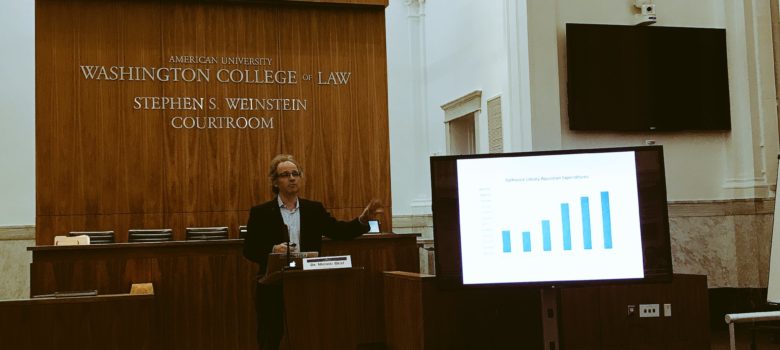Earlier this week, I had the opportunity to deliver a keynote lecture at American University, Washington College of Law on NAFTA and the digital environment. A video of the talk can be found here (my remarks start just after 11:40) and is embedded below.
The talk argued that the NAFTA renegotiations are the wrong venue to address many substantive copyright concerns, noting that trade talks are frequently used to mandate domestic reforms that are better addressed through domestic policy processes. For example, fair dealing is likely to emerge as a major issue during the upcoming Copyright Act review in Canada. There are arguments on both sides (I provided data on why oft-heard claims of harm to the publishing industry are inaccurate), but regardless of your view, the issue is better addressed through an open domestic review, not closed trade talks. Moreover, trade negotiations are far less transparent than international fora such as WIPO, override the traditional balancing effort on IP (instead requiring a balance between issues such as IP, rules of origin, dispute resolution, and more), and undermine flexibilities found within international treaties.
NAFTA may be the wrong venue for IP policy reform, but I acknowledge that an IP chapter will undoubtedly be part of a renegotiated agreement. Assuming that is the case, I argue that the ideal method of dealing with the issue is to require all parties to meet international IP treaty standards. I point to Article 18.7 of the TPP which identified nine agreements that required ratification or accession from all parties.
Assuming that NAFTA will go even further, however, I canvass 12 issues that should be considered in an effort to ensure a balanced approach to digital issues in NAFTA. These include:
- a clear affirmation of the importance of balance with a provision similar to that used in early TPP drafts
- retention of the Berne Convention standard for copyright term of life of the author plus 50 years
- inclusion of a fair use/fair dealing provision
- an intermediary liability provision that permits differing approaches such as Canada’s notice-and-notice system
- rejection of the increased criminalization of copyright
- flexible implementation of anti-circumvention rules, including an exception for lawful uses
- statutory damages provisions that distinguish between commercial and non-commercial infringement
- rules to address the chill on trade and innovation that can come from overbroad court decisions
- strong, enforceable net neutrality rules
- robust exceptions for privacy and security in any data localization or data transfer rules
- enhanced privacy protections for citizens and residents of all NAFTA parties
- inclusion of the traditional Canadian exception for culture
The full talk can be found here.







